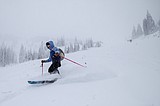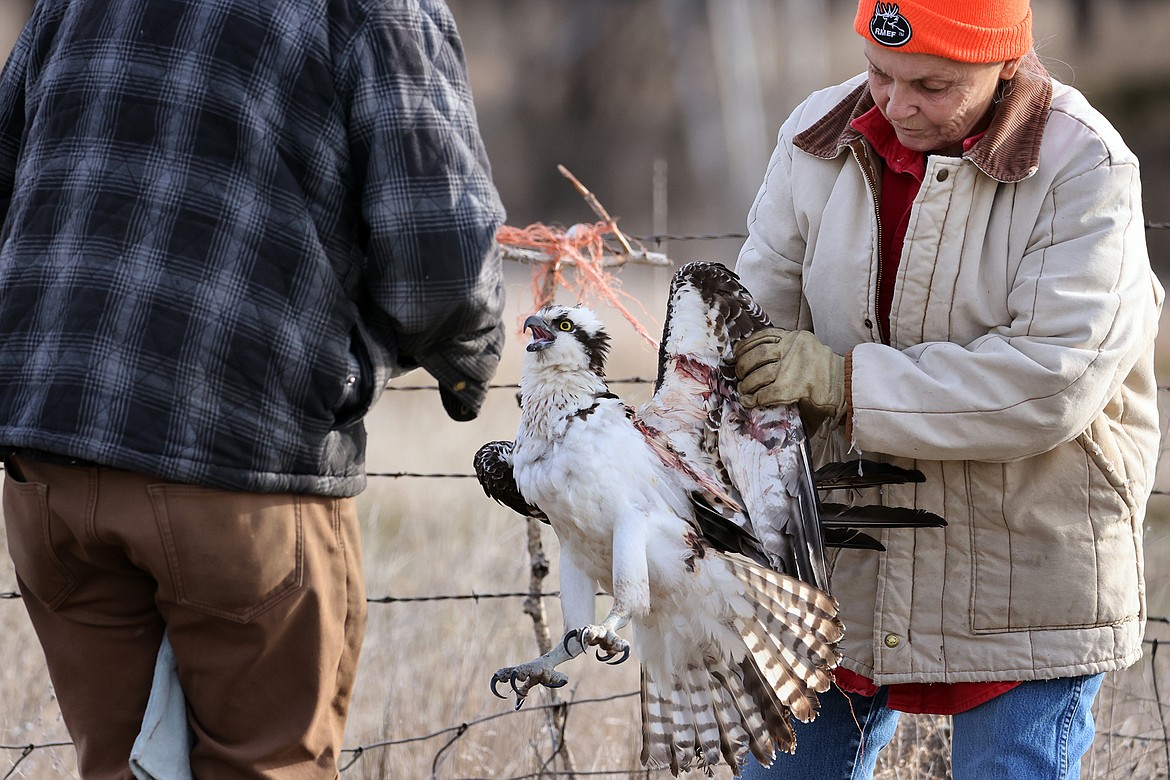Ahead of ospreys' return, Flathead Audubon raises alarm over bailing twine
KATE HESTON | Hagadone News Network | UPDATED 1 year, 9 months AGO
Kate Heston covers politics and natural resources for the Daily Inter Lake. She is a graduate of the University of Iowa's journalism program, previously worked as photo editor at the Daily Iowan and was a News21 fellow in Phoenix. She can be reached at [email protected] or 406-758-4459. | February 27, 2024 11:00 PM
Twine used to bind hay bales is incredibly dangerous to ospreys, according to the Flathead Audubon, which is boosting efforts this year to persuade residents to better dispose of the material.
The birds will collect twine, and other bits of trash, to line their nests, often becoming entangled. That can lead to serious — and often fatal — injuries.
As spring looms, the Flathead Audubon is encouraging residents to secure twine and trash before migrating osprey return and begin nesting.
“They’re just amazing raptors,” said Darcy Thomas, president of Flathead Audubon. “When these challenges are caused by mankind, I feel that there is a responsibility to clean up the issue.”
Flathead Audubon is working with the Owl Research Institute in Charlo on an education campaign to raise awareness of the danger twine poses to the birds and how to dispose of it properly, by storing it in garbage cans or big drums.
Flathead Audubon is also trying to find an alternative for recycling twine.
Ospreys love to incorporate the bailing twine into their nests as they see it as a good material, according to Thomas. Both adults and their young can get caught up in the twine, often strangling them or entangling them until they starve or succumb to injuries, she said.
“Just getting the work out to people to pick up bailing twine is so important,” she said.
Ospreys are unique birds, according to Rob Domenech, the executive director of the Raptor View Research Institute in Missoula.
They are good indicators of the overall health of the ecosystem and can alert scientists to things that may be happening in the environment, such as an increase in mercury or DDT levels.
“They are kind of like the canary in the coal mine for aquatic ecosystem health,” Domenech said.
Ospreys mainly eat fish, often nesting near bodies of water, and are excellent hunters, according to Domenech. Because they eat fish, pollutants are magnified through their prey.
Domenech founded the Raptor View Research Institute in 2004 to conduct research on local raptors. Over the years the institute has banded nearly 600 ospreys, he said, and it is very common to find bailing twine incorporated into their nests.
Every year, Domenech said, when they access nests, they often find offspring tangled in the twine.
“In this case, it’s pretty easy, just properly dispose of your bailing twine and it's a done deal,” Domenech said. “We just got to give [the birds] every chance we can.”
Ospreys themselves are dark brown from above and white from below, with a wingspan spanning from 54 to 72 inches. During the summer months, the birds can be found across the state. They are migratory birds, heading south to Central and South America in October before returning around April.
Flathead Audubon first released and spread educational pamphlets regarding the twine last year, but this year Thomas said she wants to boost efforts to get the word out.
Audubon members are volunteering and distributing pamphlets, talking to landowners, horsemen, feed stores and other outlets that are associated with bailing twine.
They are also hoping to talk to kids involved in 4H, make posters and participate in Earth Day events.
“This is an evolving project for us,” Thomas said.
Reporter Kate Heston can be reached at [email protected] or 758-4459.
ARTICLES BY KATE HESTON

Veteran-owned mobile boat repair service anchors down in the Flathead Valley
The Kramers launched Flathead Mobile Marine to use their skills — they have decades of experience performing routine maintenance checks on a variety of boats as well as working with engines and electrical systems — and help boaters in the community.

With ski season near, resort reaches deal with staff
After 18 months of negotiations, Whitefish Mountain Resort executives and the resort’s ski patrol union are finalizing a one-year contract for the upcoming season.

Trapped in a car wreck, Woods Bay woman credits teens with saving her life
Driving home from a quilting event in Bigfork in September of last year, Carol Martin remembered that the sky was clear, the sun was shining, and she had a headache.

